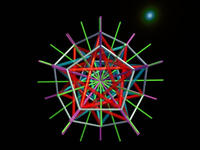| Consensus and Consent -- Making Synergic Decisions | 2002-12-23 03:17 8 comments |
 by Flemming Funch by Flemming FunchTimothy Wilken writes: "Today, mind and brain scientists have made enormous progress in understanding how the human brain works. There has been many surprises in these recent advances. But the biggest shocker is that the brain doesn't decide what to do. Decision making is not controlled centrally in the brain. The mind-brain appears to act as a coordination and consensus system for all the cells, tissues, and organs in the body. The brain doesn't decide to eat. The cells of the body decide to eat, the brain coordinates their activity and carries out the consensus will. Our human brain stores the gathered information from the body's sensing of its environment, the brain presents opportunities for action reflective of both the sensing of environment and the needs and goals of the 40,000,000,000,000 cells it serves. The brain is not the leader of the body, it is the follower of the body. It is a system that matches needs in the body with its sensing of opportunities to meet these needs by action within the environment. The brain is a 'government' that truly serves its constituents– the cells, tissues, and organs that make up the human body. The apparent " I " is not real. It is really a " We ". ... If the human body can using unanimous rule democracy and synergic consensus can organize and coordinate the actions of 40 trillion cells so totally that we identify the whole organism as a single individual, then we humans should be able to use these same mechanisms to organize our species and solve our human problems..." |